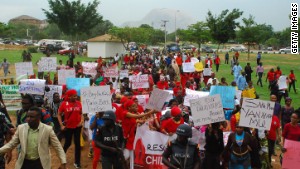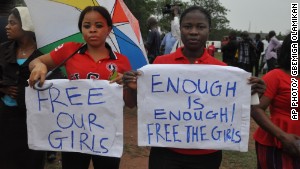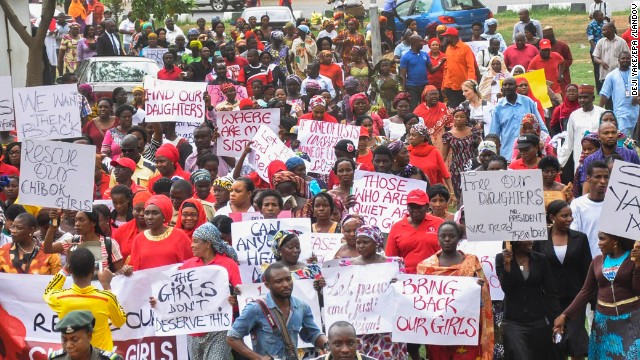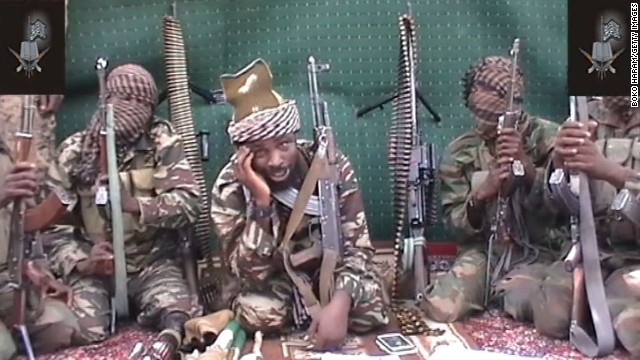I heard about this late Saturday night.
It's a horrible story and it has taken way to long to come to international attention.
http://www.cnn.com/2014/05/05/world/africa/nigeria-abducted-girls/
'I will sell them,' Boko Haram leader says of kidnapped Nigerian girls
By Aminu Abubakar and Josh Levs, CNN
(CNN) -- Fears for the fate of more than 200 Nigerian girls turned even more nightmarish Monday when the leader of the Islamist militant group that kidnapped them announced plans to sell them.
"I abducted your girls. I will sell them in the market, by Allah," a man claiming to be Boko Haram leader Abubakar Shekau said in a video first obtained by Agence France-Presse.
 Call to #bringbackourgirls in Nigeria
Call to #bringbackourgirls in Nigeria Police: 223 abducted girls still missing
Police: 223 abducted girls still missing Jones outraged 200 girls kidnapped
Jones outraged 200 girls kidnapped
"There is a market for selling humans. Allah says I should sell. He commands me to sell. I will sell women. I sell women," he continued, according to a CNN translation from the local Hausa language.
Boko Haram is a terrorist group receiving training from al Qaeda affiliates, according to U.S. officials. Its name means "Western education is sin." In his nearly hourlong, rambling video, Shekau repeatedly called for Western education to end.
"Girls, you should go and get married," he said.
The outrageous threat means the girls' parents' worst fears could be realized. Parents have avoided speaking to the media for fear their daughters may be singled out for reprisals.
U.S. State Department spokeswoman Marie Harf said the video "does appear legitimate."
The tape won't intimidate or deter Nigeria from efforts to save the kidnapped girls, the Nigerian government said.
"It is disheartening that someone would make such a terrible boast," Doyin Okupe, spokesman for President Goodluck Jonathan, said in an interview with CNN.
"It is to be expected of terrorists," he added. "No group can affect our resolve. We will see this through to the end. We have the commitment and capacity to get this done. No matter what this takes, we will get these girls."
On Sunday, Jonathan vowed, "Wherever these girls are, we'll get them out."
But he also criticized the girls' parents, saying they weren't cooperating fully with police. "What we request is maximum cooperation from the guardians and the parents of these girls. Because up to this time, they have not been able to come clearly, to give the police clear identity of the girls that have yet to return," he said.
Weeks after the girls' April 14 kidnapping, Africa's most populous country seems to be no closer to finding them, triggering complaints of ineptitude -- some of which are expressed on Twitter with the globally trending hashtag #BringBackOurGirls.
On Sunday, about 100 demonstrators gathered outside the Nigerian High Commission in London, chanting, "Bring them back!" and "Not for sale!"
Crowds from Los Angeles to London rallied Saturday as well.
"Access to education is a basic right & an unconscionable reason to target innocent girls," former U.S. Secretary of State Hillary Clinton wrote Sunday on Twitter. "We must stand up to terrorism. #BringBackOurGirls."
 Nigerians protest over kidnapped schoolgirls
Nigerians protest over kidnapped schoolgirls Boko Haram: Nigeria's crisis
Boko Haram: Nigeria's crisis
According to accounts, armed members of Boko Haram overwhelmed security guards at a school last month, pulled the girls out of bed and forced them into trucks. The convoy of trucks then disappeared into the dense forest bordering Cameroon.
On Friday, Nigerian authorities updated the number of girls kidnapped to 276. At least 53 of the girls escaped, leaving 223 in the hands of their captors, police said.
Authorities said the number of missing girls could grow as police fill in spotty school enrollment records.
Families had sent their girls to the rural school in Chibok for a desperately needed education. The northeastern town is part of Borno state, where 72% of primary-age children never attended school, according to the U.S. Embassy in Nigeria.
It's even worse for girls than boys. "In the North particularly, the gender gap remains particularly wide and the proportion of girls to boys in school ranges from 1 girl to 2 boys to 1 to 3 in some states," UNICEF says.
Twelve northern states follow Sharia law.
In recent years, Boko Haram has carried out dozens of attacks, killing thousands of people at schools, churches, police stations, government buildings and elsewhere. Targets include Christians, senior Islamic figures critical of Boko Haram and people the group believes are engaged in "un-Islamic" behavior, the U.S. Commission on International Religious Freedom says.
Boko Haram has gained training in weapons and communications from al Qaeda in the Islamic Maghreb and al Qaeda in the Arabian Peninsula in recent years. This helped it move from little-noticed attacks to more spectacular ones, including against Western targets and the Nigerian government, which it seeks to overthrow, U.S. authorities say. In 2011, it carried out an attack with IEDs on the United Nations headquarters in Abuja.
It's unclear just how big the group is. The U.S. State Department says Boko Haram's membership estimates "range from the hundreds to a few thousand." A U.S. government report in December 2011 found that a "consistent lack of reliable reporting on Boko Haram has contributed to the difficulty in assessing its size, makeup, and goals."
Though Nigeria has Africa's largest economy, driven largely by oil, poverty remains widespread: Nearly 62% of the country's nearly 170 million people live in extreme poverty, according to the CIA World Factbook.
That dichotomy takes center stage this week as a World Economic Forum meeting convenes Wednesday in Nigeria's capital of Abuja. The country "already plays a crucial role in advancing the continent's growth; yet it is also emblematic of the challenges of converting natural wealth into solutions that address persistent social challenges," the World Economic Forum on Africa says on its website.
The United States is sharing intelligence with Nigeria to help in the search, according to a U.S. official with direct knowledge of the situation.
"We are sharing intelligence that may be relevant to this situation. You are going to see a focus on this in all three channels of government: diplomatic, intelligence and military," the official said, speaking on the condition of anonymity because of the sensitive nature of the information.
Police in Abuja denied having arrested a leader of a protest over the weekend that was critical of the Nigerian government's efforts. In a statement, police said they "invited" Nyadar Naomi Mutah, a native of Chibok, for a "fact-finding interview." She cooperated and "was immediately allowed to return home to her loved ones," police said.
But Aminu Mahmoud, a lawyer representing Mutah, said her client was arrested Sunday without charge.
Fellow protest organizer Hadiza Usman said that during a session called by first lady Patience Jonathan to meet with protesters, the first lady recognized Mutah and said "let's keep you aside for now." It was not clear whether that had anything to do with Mutah's later going to the police station.
In its statement on the matter, Abuja police also said security agencies "are leaving no stone unturned" in an attempt to ensure that the children are rescued.
CNN's Evan Perez contributed to this report.
No comments:
Post a Comment